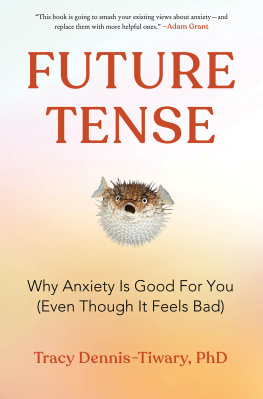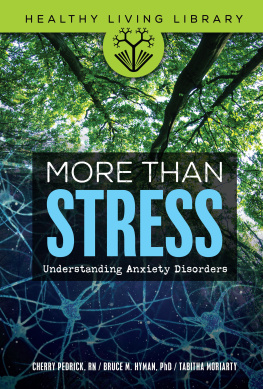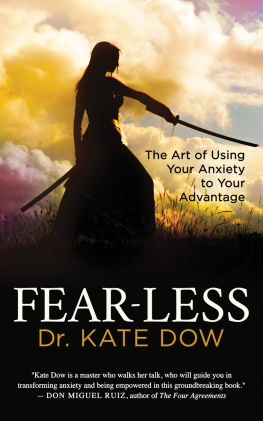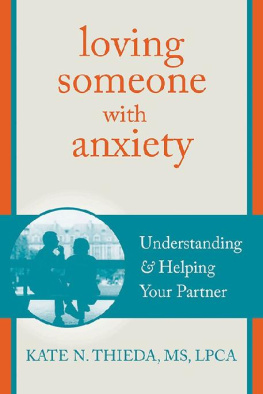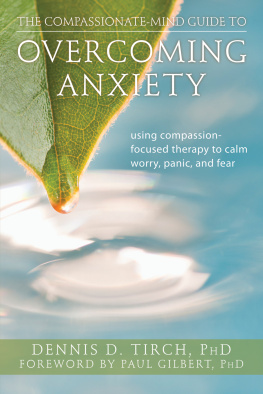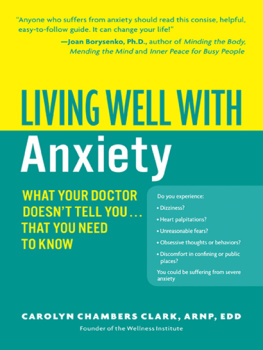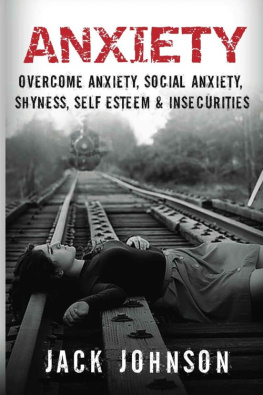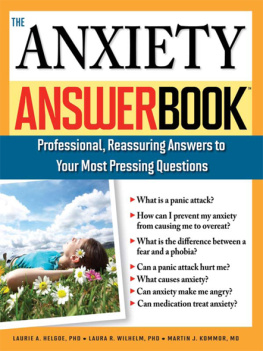Contents
Guide
For Vivek, Kavi, and Nandini
Whoever has learned to be anxious in the right way, a famous philosopher once wrote, has learned the ultimate.
Hang ontheres a right way and a wrong way to be anxious? That sounds to me like one more thing to be anxious about.
Yet Sren Kierkegaard, whom I like to think of as the Patron Saint of Anxiety, was onto something important.
You hate feeling anxious. I do, too. Everybody does. Its an emotion that can be distressing, burdensome, and debilitating. And because of that were all missing the very thing Kierkegaard was getting at: anxiety wants to be our friend. It wants to be recognized and acknowledged and listened to and cherished and heeded. It feels terrible because its trying to tell us something important that wed rather not hearas a good friend often does. Because if we do listen, our lives will be infinitely better than if we do what we really want to do when anxiety pays us a visit: run away and hide.
Whats wrong with that? Isnt anxiety a personal failure, a sign that something is wrong with us and with our life, something to be fixed and eradicated? Yet nobody in the history of time ever eradicated anxietythank goodness, because that would be a disaster.
This book is the story of an emotion that is painful and powerful, terrible and funny, exhausting and energizing, and imperfect. Its like life. Its like being human. It is being human. If you read this book, I believe you will change the way you view anxiety. Its like the famous optical illusion Rubins vase: look at it one way, and you see a vase, but relax your gaze and out pop two people in profile looking at each other across the vase-shaped space that separates them.
Making this paradigm shift, reclaiming anxiety as our friend and ally, isnt just going through a set of exercises and interventions. Its not just my telling you that anxiety sucksalthough it really, really does at timesand describing twenty things you can do to feel better. Nor is it my telling you to glorify anxiety, or believe that you always need anxiety to be productive, creative, or to perform at your peak. You dont. Rather, its creating a new mindset about anxietya fresh set of beliefs, insights, and expectations that allows you to explore anxiety, learn from it, and leverage it to your advantage. Achieving a new mindset will not fix anxiety itselfbecause the emotion of anxiety is not broken; its how we cope with anxiety thats broken. Creating a new mindset is the bestand only waywe can repair that. This is the sole purpose of this book.
I hope Saint Sren would approve.
Part I
Why We Need Anxiety
What Anxiety Is (and Isnt)
Dr. Scott Parazynski and his space shuttle crewmates were speeding seventeen thousand five hundred miles an hour on their way out of Earths atmosphere. Their destination was the International Space Station, a scientific hub, a stepping-stone for exploration of the solar system, and the largest structure humans have ever put into space. To many people, the ISS represents the pinnacle of human achievement.
By the time that mission took place in 2007, Scott was a veteran of four space shuttle flights and several extravehicular activitiesspace walksin orbit. After retiring from NASA, he became the first person to have both flown in space and climbed to the summit of Mount Everest. This is a person who is comfortable with risk. But this mission carried an additional burden of significance. It had been delayed for three years after the space shuttle Columbia disaster, in which the spacecraft had disintegrated as it reentered the atmosphere, killing all seven crew members.
Yet for Scott and his team, the mission was worth the potential danger. They were to deliver and install a key component of the ISS that would connect and unify the US, European, and Japanese space labs within the station, providing additional power and life support and significantly expanding its size and capabilities.
After a week of new installations and routine repairs, things took an unexpected turn. Scott and a fellow crew member had just installed two huge power-generating solar cell panels. When the panels were opened and extended for the first time, a guide wire snagged, causing two large tears in them. That was a serious problem because the damage prevented the panels from expanding fully and generating enough energy to do their job.
For Scott to repair the torn solar cells, the team had to jury-rig an exceptionally long tether that would attach Scott to the end of a boom and then connect himby his feetto the end of the ISSs robotic arm. Dangling from the boom, it took him forty-five minutes to move ninety feet along the wing and reach the damaged panels. His skills as a surgeon were crucial as he painstakingly cut the snagged wire and installed stabilizers to reinforce the structure.
After seven nail-biting hours, the mission was a success. The crew on the ISS and the team back on Earth erupted into cheers as the repaired panels successfully expanded to their full length. A photograph of Scott seeming to fly above the glowing orange solar wing is an iconic image of intrepid exploration in space. His achievement is said to have inspired the death-defying spacecraft repair depicted in the movie Gravity.
Almost eight years after his celebrated feat, I had the immense pleasure of speaking with Scott on the stage of the Rubin Museum of Arts Brainwave program in New York City. Tall, blond, and rugged, he looks like a circa-1950s American hero. He has the manners of one, too, with his easy smile and sincere humility.
I asked Scott how he had kept his cool that day with nothing but a space suit between him and the void. With the fate of the mission resting on his shoulders, what had been the secret of his success?
The answer? Anxiety.
Anxiety and Fear
I probably dont need to tell you what anxiety is.
It is a fundamentally human emotion, our companion since Homo sapiens walked upright. Anxiety activates our nervous systems, making us jittery and on edge, with butterflies in our stomach, a pounding heart, and racing thoughts. The word, derived from the Latin and ancient Greek words for to choke, painfully constricted, and uneasy, suggests that it is both unpleasant and a combination of the physical and emotionala lump in our throat, our body paralyzed with fear, our mind frozen with indecision. It wasnt until the seventeenth century that the word was commonly used in English to describe the range of thoughts and feelings we recognize today as anxiety: worry, dread, angst, and nervousness about situations with an uncertain outcome.
Often, you know why you are anxious: Your doctor calls, telling you she wants to schedule a biopsy. You are about to step out on stage to give a career-making speech before a crowd of five hundred strangers. You open a letter from the IRS informing you that it is auditing your tax return. Other times, our anxiety is more elusive, without any clear cause or focus. Like a maddeningly persistent alarm, this free-floating anxiety tells us that something is going wrong, but we cant find the source of the beeping.
Whether general or specific, anxiety is what we feel when something bad could happen but hasnt happened yet. It has two key ingredients: bodily sensations (unease, tension, agitation) and thoughts (apprehension, dread, worry that danger might be around the corner). Put the two together, and we see why choking gave anxiety its name. Where should I go, what should I do? Will it be worse if I turn left or right? Maybe its best if I just shut down or disappear altogether.
Anxiety is experienced not only as a feeling in our bodies but also as a quality of our thoughts. When were anxious, our attention narrows, we become more focused and detail oriented, and we tend to see the trees instead of the forest. Positive emotions do the opposite: they broaden our focus so that we get the gist of a situation rather than the details. Anxiety also tends to get our minds moving, worrying about and preparing for negative possibilities.

